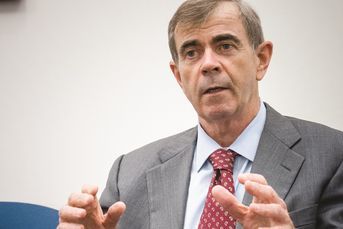Merrill Lynch keeps a tight grip on clients
The percentage of assets the firm retains when advisers leave is double industry average
Bank of America Merrill Lynch has a strong grip on client assets that may make it harder for some advisers to break away with the bulk of their books intact.
Merrill Lynch retained 40% to 50% of assets tied to advisers who departed last year for other firms, about double the industry average, according to Bank of America spokesman Matthew Card.
Firms typically keep 23% of assets when advisers move from one wirehouse or regional broker-dealer to another, data from Cerulli Associates show. The industry average is 28% when advisers move to independent channels.
Merrill’s success at keeping client assets at its full-service brokerage unit may be bucking a trend seen benefiting break-away advisers in the wake of Lehman Brothers Holdings Inc.’s collapse in 2008. Clients generally have become more loyal to their advisers since the financial crisis, according to Danny Sarch, president of wealth management recruiting firm Leitner Sarch Consultants.
While the crisis made people “suspicious of the big institutions,” he said, “the experienced adviser is a constant in a turbulent industry.”
Many have been anticipating a wave of departures from the so-called wirehouses, or the full-service brokerage units of Bank of America, Morgan Stanley, UBS Group AG and Wells Fargo & Co., as the long-term retention deals they offered to financial advisers during the 2008 financial crisis to keep their businesses going begin to expire.
Wirehouses tend to aggressively solicit assets of departing advisers, prompting most to leave on a Friday, believing their former colleagues will be less motivated to use the weekend to reach their clients, according to Mr. Sarch.
“If I’m an adviser sitting at Merrill Lynch, and I’ve built my business off the crumbs of departing advisers, then why would I expect to keep most of the assets when I leave?” he asked.
Mr. Sarch said the regionals have always relied on the adviser to be the brand. Raymond James Financial Inc., the St. Petersburg, Fla.-based broker-dealer that has been expanding beyond its roots in the Southeast, doesn’t solicit client assets when advisers leave as a matter of policy. That may hold appeal to those considering joining the firm.
In fiscal 2015, Raymond James’ private client group, which includes its employee and independent brokerage businesses, posted its second-best year for recruiting behind 2009, when banks were struggling to recover from the financial crisis, according to its annual reports.
Merrill Lynch’s full-service brokerage business has kept 40% to 50% of its client assets for the past three to five years, an average based on assets transitioning outside the firm during the first year of an adviser’s departure, according to the Bank of America spokesman. Merrill says the retention is helped in part by its goals-based relationship with clients and the strength of the brand it has developed over the past 100 years.
The Charlotte, N.C.,-based bank’s brokerage unit, acquired in 2009, has influenced the way the industry handles the movement of advisers and assets between firms.
In the 1990s, “Merrill Lynch was the first to sue advisers when they left, claiming that clients were owned by the corporation and not the advisers,” said Mr. Sarch. He played down any impact this may have today on client assets leaving the firm’s door as Merrill later became a founding member of the 2004 “broker protocol” to help end litigation.
The protocol is an industry agreement that helps protect the interests of all parties — brokerage firms, advisers and clients — when there’s a change of employer, laying out rules for advisers to follow when leaving, he said.
Learn more about reprints and licensing for this article.






